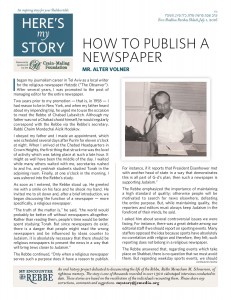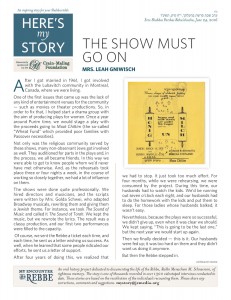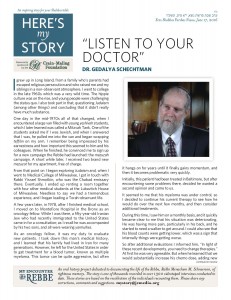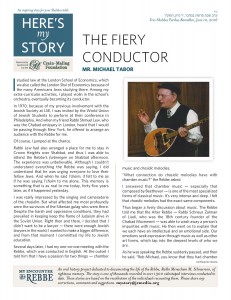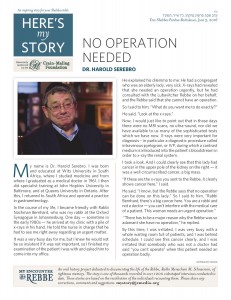How to Publish a Newspaper
I began my journalism career in Tel Aviv as a local writer for the religious newspaper Hatzofe (“The Observer”). After several years, I was promoted to the post of managing editor for the entire newspaper.
Two years prior to my promotion – that is, in 1958 – I had reason to be in New York, and when my father heard about my impending trip, he urged me to use the occasion to meet the Rebbe of Chabad Lubavitch. Although my father was not a Chabad chasid himself, he would regularly correspond with the Rebbe via the Rebbe’s secretary, Rabbi Chaim Mordechai Aizik Hodakov.
I obeyed my father and I made an appointment, which was scheduled several days after Purim for eleven o’clock at night. When I arrived at the Chabad Headquarters in Crown Heights, the first thing that struck me was the level of activity which was taking place at such a late hour. It might as well have been the middle of the day. I waited while many others waited with me, secretaries rushed to and fro, and yeshivah students studied Torah in the adjoining room. Finally, at one o’clock in the morning, I was ushered into the Rebbe’s study.
As soon as I entered, the Rebbe stood up. He greeted me with a smile on his face and he shook my hand. He invited me to sit down and, after a brief introduction, we began discussing the function of a newspaper – more specifically, a religious newspaper.
“The truth of the matter is,” he said, “the world would probably be better off without newspapers altogether. Rather than reading them, people’s time would be better spent studying Torah. But since newspapers do exist, there is a danger that people might read the wrong newspapers and be influenced by ideas counter to Judaism, it is absolutely necessary that there should be religious newspapers to present the news in a way that will bring Jews closer to Judaism.”
The Rebbe continued, “Only when a religious newspaper serves such a purpose does it have a reason to publish. For instance, if it reports that President Eisenhower met with another head of state in a way that demonstrates this is all part of G-d’s plan, then such a newspaper is supporting Judaism.”
The Rebbe emphasized the importance of maintaining a high standard of quality; otherwise people will be motivated to search for news elsewhere, defeating the entire purpose. But, while maintaining quality, the reporters and editors must always keep Judaism in the forefront of their minds, he said.
I asked him about several controversial issues we were facing. For instance, there was a great debate among our editorial staff if we should report on sporting events. Many staffers opposed the idea because sports have absolutely no correlation with religion and therefore, they felt, such reporting does not belong in a religious newspaper. (more…)


